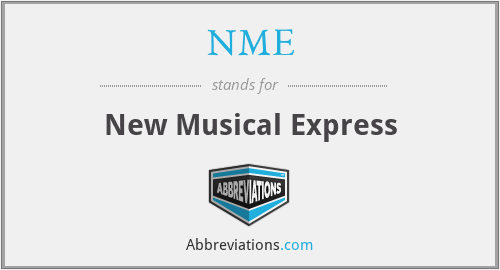What does NME mean in Music?
This page is about the meanings of the acronym/abbreviation/shorthand NME in the Community field in general and in the Music terminology in particular.
Translation
Find a translation for New Musical Express in other languages:
Select another language:
- - Select -
- 简体中文 (Chinese - Simplified)
- 繁體中文 (Chinese - Traditional)
- Español (Spanish)
- Esperanto (Esperanto)
- 日本語 (Japanese)
- Português (Portuguese)
- Deutsch (German)
- العربية (Arabic)
- Français (French)
- Русский (Russian)
- ಕನ್ನಡ (Kannada)
- 한국어 (Korean)
- עברית (Hebrew)
- Gaeilge (Irish)
- Українська (Ukrainian)
- اردو (Urdu)
- Magyar (Hungarian)
- मानक हिन्दी (Hindi)
- Indonesia (Indonesian)
- Italiano (Italian)
- தமிழ் (Tamil)
- Türkçe (Turkish)
- తెలుగు (Telugu)
- ภาษาไทย (Thai)
- Tiếng Việt (Vietnamese)
- Čeština (Czech)
- Polski (Polish)
- Bahasa Indonesia (Indonesian)
- Românește (Romanian)
- Nederlands (Dutch)
- Ελληνικά (Greek)
- Latinum (Latin)
- Svenska (Swedish)
- Dansk (Danish)
- Suomi (Finnish)
- فارسی (Persian)
- ייִדיש (Yiddish)
- հայերեն (Armenian)
- Norsk (Norwegian)
- English (English)
Definition
What does NME mean?
- NME
- New Musical Express (NME) is a British music, film, gaming, and culture website and brand. Founded as a newspaper in 1952, with the publication being referred to as a 'rock inkie', the NME would become a magazine that ended up as a free publication, before becoming an online brand which includes its website and radio stations.As a 'rock inkie', NME was the first British newspaper to include a singles chart, adding that feature in the edition of 14 November 1952. In the 1970s, it became the best-selling British music newspaper. From 1972 to 1976, it was particularly associated with gonzo journalism then became closely associated with punk rock through the writings of Julie Burchill, Paul Morley, and Tony Parsons. It started as a music newspaper, and gradually moved toward a magazine format during the 1980s and 1990s, changing from newsprint in 1998. The magazine's website NME.com was launched in 1996, and became the world's biggest standalone music site, with over sixteen million users per month. With newsstand sales falling across the UK magazine sector, the magazine's paid circulation in the first half of 2014 was 15,830. In September 2015, the NME magazine was relaunched to be distributed nationally as a free publication. The first average circulation published in February 2016 of 307,217 copies per week was the highest in the brand's history, beating the previous best of 306,881, recorded in 1964 at the height of the Beatles' fame. By December 2017, according to the Audit Bureau of Circulations, average distribution of NME had fallen to 289,432 copies a week, although its then-publisher Time Inc. UK claimed to have more than 13 million global unique users per month, including 3 million in the UK. In March 2018, the publisher announced that the print edition of NME would cease publication after 66 years and become an online-only publication.NME was acquired in 2019 by Singaporean music company BandLab Technologies, which put all of its music publications under the NME Networks brand in December 2021, when the company was restructured.
Popularity rank by frequency of use
How popular is NME among other acronyms?
NME#1#3063#12977
Embed
Citation
Use the citation below to add this abbreviation to your bibliography:
Style:MLAChicagoAPA
"NME." Abbreviations.com. STANDS4 LLC, 2025. Web. 5 Feb. 2025. <https://www.abbreviations.com/term/107241>.






Discuss this NME abbreviation with the community:
Report Comment
We're doing our best to make sure our content is useful, accurate and safe.
If by any chance you spot an inappropriate comment while navigating through our website please use this form to let us know, and we'll take care of it shortly.
Attachment
You need to be logged in to favorite.
Log In